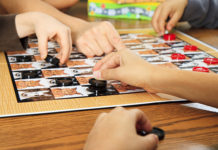I recently was asked to be the speaker at an event that was scheduled right after I’d be coming home from a trip. I happily agreed, put down the phone, and promptly proceeded to get nervous. What if the plane was delayed? What if my kids didn’t sleep well all cramped together on the trip, woke me up all night, and then generously shared the sleep deprivation with me? What if I couldn’t rub two brain cells together to offer up a coherent sentence after a day of cross-country travel? Instantly, my mind was off to the races despite the fact that the trip was an entire month away.
Thankfully, I was able to bring myself back to the present moment by realizing that either I could be thinking about all these totally unknown factors that may or may not ever come into play (and had I considered the possibility that a meteor might strike the earth?) or I could go about enjoying my life for the next month, enjoy the trip at the end of the month, and then go ahead and let all my nerves run wild during that one hour before the speech when I had a better sense of what actually played out. Thank G-d, I was able to do the latter and everything fell into place, the speaking engagement worked out fine, and even the meteor decided not to head our way.
The tool I employed here is one of the gems behind the Cognitive Behavioral Therapy approach that has become a powerhouse in psychology over the last couple of decades. Known as mindfulness, it is the ability to not let sadness, fears, or even recurring thoughts ruin the present moment. After all, reasons for anxiety often exist in the past or the future, but rarely in the exact moment a person is presently living in. In other words, anxiety mainly comes from being upset over something that happened in the past, or being afraid of something that might happen in the future, but in the here and now the moments we are occupying are usually quite peaceful and often even downright enjoyable.
Classic examples include people that can’t enjoy the last innings of a night out at a ballgame because they are worried about traffic on the way home, or people that can’t enjoy a meal out for a special occasion at a restaurant because they are worried about the emails piling up in their inbox while they dine. But take an everyday, commonplace scenario as well. Think about a drive in your car when you are stressing about a difficult conversation you need to have with your boss once you get to work. You are all worked up over worries of what might happen in that future conversation, but meanwhile there is so much serenity you are failing to notice in the current moment: the delicate hum of the car, the cool air rushing through your window, the brilliant sun shining outside, and so much more that would be enjoyable if you would just let yourself focus on your present surroundings during the ride, instead of trying to preemptively figure out all the things that could go wrong with the future encounter.
The question is, why ruin any other moments that exist outside that future conversation? The car ride is yours to enjoy or ruin depending on whether you want to let anxiety over a future moment seep into your present chance at peace. The truth is that the more you think of it, most of life is the car ride, and very few moments are the anxiety-provoking- conversation- with- the- boss variety. Or in other words, life is busy happening while we are worrying about other things. Bring yourself back to the present moment whenever you find your mind spiraling out of control, and you will find so much more serenity in the here and now.
The more I learn about mindfulness, the more I see it in the Jewish tradition as well. Mindfulness is called menuchas hanefesh and the concept is elaborated upon skillfully by Rav Chaim Freidlander in his essay on the topic in Sifsei Chaim. Rabbi Friedlander insists that a person’s spiritual wellness depends on their ability to be present. He astutely observes that young people are often frustrated because they are living in the future and the elderly are similarly stymied by living in the past. The theme of presentness plays out in prayer (being present before the Almighty), in Sabbath observance (being present in a point in time), and general existence (being present in and with one’s personal destiny). Menuchas haNefesh\mindfulness is a critical tool for happiness. Only by living in the here and now can we find true happiness and peace.
I would encourage people to talk to their older children about this topic by name so they have a word to associate with their experiences. When they are stressing out about something in their future (a school test, dating, etc.), encourage them to slow down. Tell them to close their eyes and ‘listen’ to the current moment- stop thinking about what is bothering them and just breathe, listen to the sound of nature outside, think how wonderful it feels to be alive right now. Tell them that for the next week whenever that anxiety-ridden future topic comes up in their mind to do the same refocusing exercise, or to even pick something that they would like to pull their mind to instead in order to get in the habit of refocusing (thoughts of a vacation they will be taking soon, plans they want to make with their friends for this upcoming weekend, how excited they are for summer camp, etc.), and slowly it will become a habit for them to inhabit their present moments instead of being locked out from them by worries of the future.
While it is harder to teach younger children to be mindful directly, we can teach them certain pieces of mindfulness at a young age and develop these skills as they grow older. First, teach them how to be present, and never underestimate the power of distraction to help them learn how to refocus. Often, when things escalate to a tantrum, children don’t even remember why they are so upset a few minutes in, and so if you fall into the trap of trying to talk them out of being upset by discussing the merits of their positions, nothing positive is going to happen. Therefore, instead of reasoning with them in the heat of their upsetness, try simply refocusing them on something else in their immediate surroundings. Often they are then able to move past the crying seamlessly. It could be as simple as, “Hey, did you notice how much snow fell outside this morning? Let’s go look” or take their hand to lead them to the kitchen and say “let’s go have some warm apple juice” and suddenly they are refocused on the present moment and no longer crying. I know it sounds too good to be true, but try it and see for yourself. Refocusing on the moment can be taught even from a young age.
The question that often comes up is how this is any different than ‘escapism’- trying to ignore or hide from reality. The answer is that with mindfulness you are not saying that problems in your life don’t exist, you are merely saying that they don’t need to take over your life and control you at every given moment. Mindfulness allows you to put boundaries in place and it allows you to not let yourself dwell or wallow. You are compartmentalizing what gets thought about when, and not letting the past or future ruin your present. We need to teach our children that we actually do have control over our minds and we do have control over our thoughts, and so we can rehash something that happened last week, or last month, or even last year a thousand times, or one time and be done. Or we can be afraid or nervous about something we have to do next week for the entire week leading up to it, or only for that hour, or even just for a few minutes leading up to it!
The power we have over our pain and fear is greater than we think, but only if we are able to harness our minds and not let our minds harness us. As the saying goes, “Yesterday is history, tomorrow is a mystery and today is G-d’s gift….” And so, as we teach our children to embrace this mysterious gift known as the “present” may they merit to handle it with care and truly live all the days of their lives…
** Originally published in Times of Israel







